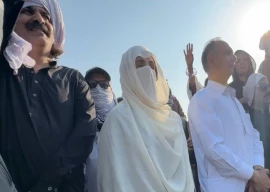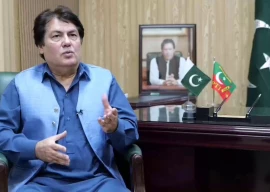Realising the importance of science and technology to generate positive growth, the United States has announced $4 million in new grants for Pakistani and American researchers to collaborate on projects and research in the two fields.
The announcement was made at the launching ceremony of Phase-V of the Pakistan-US Sciences and Technology Cooperation Programme by the US Charge d’affaires Richard Hoagland, together with Executive Director of the Higher Education Commission (HEC) Sohail Naqvi and Secretary of the Ministry of Science and Technology Akhlaq Ahmad Tarar. The ceremony was held at the HEC on Wednesday.
Hoagland, who is the Deputy US Ambassador to Pakistan, praised the success of over 70 joint projects funded over the previous four phases and encouraged Pakistani scientists and researchers to apply for the Pakistan-US Science and Technology Cooperation Programme funds before the November 30, 2012 deadline, with one goal in mind: improving the economic conditions and standards of living for Pakistanis across the country.
“The Science and Technology Cooperation Programme is one of the highlights of the US and Pakistan’s bilateral relationship. This opportunity will not only support joint research between the two countries across a wide range of topics, but will also help bring the fruits of the research into the hands of the private sector. This will help increase opportunities of transferring technology and supporting broad-based economic growth in Pakistan,” Deputy Ambassador Hoagland said.
During the event, a select cadre of scientists shared their innovative research with US embassy guests.
Hoagland was impressed to see the impact of a telemedicine project at the Holy Family Hospital in Rawalpindi that connects doctors from remote areas of Pakistan through teleconferencing.
Hoagland also praised scientists working on a solar energy project housed at COMSATS Institute of Information Technology and a sewage treatment project at the Quaid-e-Azam University, for improving access to energy and clean water for residents of the local community.
Presenting an overview of the programme, Naqvi said that it helped in facilitating capacity building in science, technology and research at the higher education institutions of Pakistan, with the goal of applying science and technology for socio-economic development.
Published in The Express Tribune, September 6th, 2012.
COMMENTS (1)
Comments are moderated and generally will be posted if they are on-topic and not abusive.
For more information, please see our Comments FAQ








1732643921-0/4548774-1403918848-(1)1732643921-0-270x192.webp)








U5 should extend more support to scietific community of Pakistan to percolate scientific temper at grass root level .